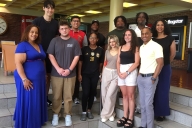You have /5 articles left.
Sign up for a free account or log in.

The University of Northern New Jersey website, as captured by the Internet Archive, in March 2016.
Screenshot/Elizabeth Redden
U.S. immigration agencies have reached a proposed settlement agreement with foreign nationals who enrolled in the University of Northern New Jersey, a fake university with no classes or professors that was set up by the federal government as part of a sting operation to crack down on student visa–related fraud.
The settlement agreement would resolve a class action lawsuit filed on behalf of foreign nationals who enrolled at UNNJ.
Under the agreement, if ultimately approved by the court, the government would reverse various adverse immigration actions it took against foreign nationals who enrolled at the sham university and would not use their enrollment against them in evaluating applications for immigration benefits in the future. Enrollment at the nonexistent UNNJ would not in itself be “sufficient grounds” for inadmissibility to the U.S. or deportation without other evidence of wrongdoing.
The government, which denies any wrongdoing, has also agreed to pay $450,000 toward the plaintiffs’ legal fees. The UNNJ enrollees who join the class action suit will not receive any monetary award.
Upon revealing the sting operation in April 2016, the government announced arrests of 21 educational recruiters, agents or brokers accused of conspiring with more than 1,000 foreign nationals to fraudulently maintain student visas at the fake school as a means to gain permission to stay—and work—in the United States.
The foreign nationals enrolled at UNNJ as “students” were not criminally charged, but the government terminated their visa statuses in the Student and Exchange Visitor Information System (SEVIS), the federal database used to maintain information about international students, leaving them without valid student visas.
Some of the students sued, alleging violations of their due process rights and the Administrative Procedure Act, which requires agencies to provide reasons for their actions.
A lower court initially dismissed the suit for lack of subject matter jurisdiction. But the U.S. Court of Appeals for the Third Circuit revived the case in 2019 in an opinion that centered around technical legal questions but also devoted substantial ink to the lengths the government went to make the fake university look realistic—the judges wrote in a footnote that “the only thing lacking appears to be reference to UNNJ’s men’s or women’s basketball team in the Final Four of the National Collegiate Athletic Association’s basketball tournament”—and to the government’s own shifting position as to whether the UNNJ “students” were willing participants in the fraud or victims of it.
According to the 2019 appellate court opinion, the government said in oral arguments that the students “were caught up in it in the sense that they were victim by the academic recruiters” and thus “were the victims of fraud.”
But in a subsequent letter to the court, cited in the court decision, the government clarified that it was not conceding “that all—or even most—UNNJ enrollees were innocent victims.”
Instead, the government said in the letter that some students “in all likelihood, knew that their academic recruiters were committing visa fraud” and that others πconspired with their academic recruiters to commit visa fraud.”
“Our position is that these people were victims,” said Elizabeth Montano, an attorney for the UNNJ enrollees. “The government set up a sting operation; they set up a fake school. They issued these students I-20s [immigration documents] saying that they could start their CPT [curricular practical training]”—a program that allows international students to work in jobs directly related their field of study—“and they didn’t have to attend classes. It is our position that these people are victims of fraud, because at the end of the day the government set this up, and basically these people got caught up in it.”
Montano said the proposed settlement is a “great outcome” and “almost everything we had been seeking originally.”
“We think it’s going to benefit most of the thousand students, and we think that the settlement really essentially reverses nearly all of the harm that the class members have suffered over the past almost five years,” Montano said.
Under the terms of the proposed agreement, the Department of Homeland Security has agreed to dismiss pending deportation proceedings against UNNJ enrollees and grant them a 180-day window after the date the settlement is finalized to apply for a new visa category, seek reinstatement of their student visas through transfer to a new institution or depart the U.S.
The government agreed it will not consider class members to have accrued unlawful presence in the U.S. for the period beginning with the date of their UNNJ enrollment through 180 days after the agreement’s effective date. That concession is important, because accrual of unlawful presence in the U.S. can lead to up to 10-year bars on re-entry into the U.S.
The government also agreed to rescind the April 2016 letters it sent to the UNNJ enrollees terminating their status in SEVIS, the federal database, and modify their SEVIS records to remove references to fraud.
The settlement would release the federal government from liability for future claims related to UNNJ enrollment.
A court hearing on whether to approve the settlement is scheduled for May 2 at the U.S. District Court for the District of New Jersey, in Newark.
A spokesperson for U.S. Citizenship and Immigration Services referred a request for questions to a document outlining the proposed settlement terms. The document says the government “denies all allegations of wrongdoing but is settling to avoid the expense and inconvenience of continuing to litigate the case.”
UNNJ is one of two known fake universities set up by the federal government to catch alleged visa fraudsters. The government revealed the existence of a second fake university, Farmington University in Michigan, in 2019.








